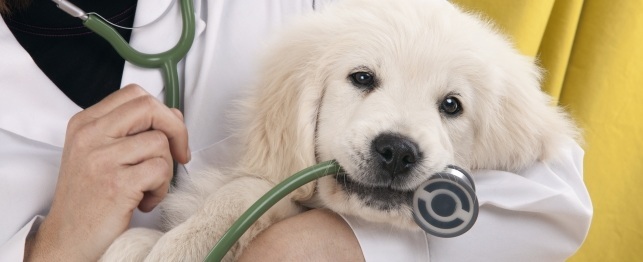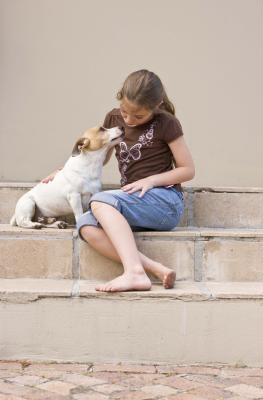Different breeds of dogs age at different rates. A large breed such as a Great Dane or Newfoundland will reach old age sooner than smaller breeds like Chihuahuas or Toy Poodles. Life spans range from 7 to 15 years, with each year equivalent to 6 or 7 human years. Despite whatever breed your dog may be, you will have to watch them closely and take him on regular visits to the vet to determine where he is in his life cycle and what special needs, if any, are required at each stage.
Regardless of when the onset of old age begins, there are changes that are common to all dogs. Behavioral problems, such as indifference to food, increased wandering, house soiling, and changes in the way your dog interacts with other dogs and people, are all signs that your dog is getting old.
The first thing you should do upon noticing any of these behavioral changes is determine the cause. That means a physical workup and a talk with your dog's vet. Aging pets will begin to have many more health issues than they did when they were younger and many times those issues will be the cause of problems such as aggression. You are grumpier when you don't feel well and your pet will be also. Unfortunately, a grumpy pet may be more likely than a human to lash out physically, and that means biting or snapping. If a previously non-aggressive dog begins to exhibit aggressive behavior, determine whether it is a physical problem that may be handled with medication. If not, simply make sure that family members and visitors realize that Fido no longer likes to be touched in that particular spot if, for instance, the problem is an arthritic hip.
Sometimes, however, decreased functioning of eyesight or hearing may cause fear aggression in a pet. In that case, make sure people know that they should warn the pet of their approach, and not to approach the pet suddenly. Simply calling out, "Hey Fido, it's me," if the pet has eyesight issues, or making sure he can see you coming if he has hearing issues, will usually do the trick.
Even if your pet is not exhibiting aggression, you will want to be alert for other changes in behavior associated with pain or failing senses. Pets with these problems may also become withdrawn and depressed. If he starts lying around all day and refuses food or playtime, then that may be a sign of depression in your pet. You will want to make the effort to deal with the physical problems, and also to make sure that the pet is still included in interactions with the family.
Any sudden changes in your dog's habits may indicate that he is getting old. However, you should try to first rule out that it is not a physical problem that is causing the change in behavior. Decreased bladder control or aching joints could keep your dog from wanting to go out as often as he should. Nutrition is also to be taken into consideration, as older dogs have different ones from their younger, more active counterparts. Above all, have patience. Your dog's life and yours is changing. Don't give up or abandon him, because he needs you now more than before.

 Top 10 Dog Heart Murmur Symptoms
What i
Top 10 Dog Heart Murmur Symptoms
What i
 Is Pet Insurance Right for Your Puppy?
Is Pet Insurance Right for Your Puppy?
Is Pet Insurance Right for Your Puppy?
Is Pet Insurance Right for Your Puppy?
 Warning! Water Hemlock Kills Dog in an Hour
A 3-year-old Border Collie mix rece
Warning! Water Hemlock Kills Dog in an Hour
A 3-year-old Border Collie mix rece
 How to Stop Your Dog From Eating Rocks
How to Stop Your Dog From Eating Rocks
How to Stop Your Dog From Eating Rocks
How to Stop Your Dog From Eating Rocks
 How to Stop My Dog From Eating Tissues
How to Stop My Dog From Eating Tissues
How to Stop My Dog From Eating Tissues
How to Stop My Dog From Eating Tissues